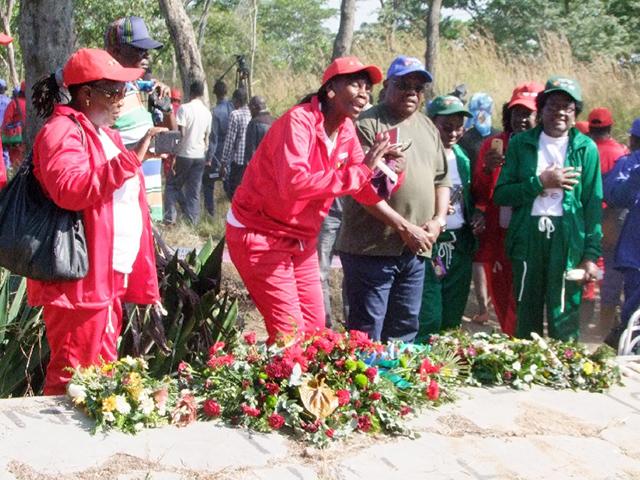RAMATEX employees celebrated success on Saturday when a work stoppage resulted in a more favourable agreement with the Malaysian-run textile factory.
After years of lobbying and almost two full days of demonstrating outside the Windhoek textile factory, the Namibia Food and Allied Workers’ Union (Nafau), the National Union of Namibian Workers (NUNW) and Ramatex management signed an agreement on Saturday night, increasing wages by N$1,10 an hour. The N$1,10 increase is the first salary increase to be granted to Ramatex workers since the Windhoek factory opened in 2001.In addition, workers will receive an annual bonus of 60 per cent of their monthly salary starting this December.Ramatex also agreed to introduce pension fund and medical aid benefits, and transport and housing allowances for all Namibian employees.The agreement is effective from October 1.Workers will also receive a N$100 transport allowance and N$150 housing allowance every month.Furthermore, the company will pay 70 per cent of their medical aid fund contributions.A union request for backdating the wage increases was rejected, however.Several unionists congratulated the workers over the weekend for the determination they showed in standing up to the company despite fears that the strike might lead to the Malaysians closing up shop in Namibia.”You have to really give it to these workers for deciding that enough is enough and they’re not going to take it any more,” outgoing LaRRI director Herbert Jauch said on Saturday, when checking on the progress of demonstrations.Nafau officially notified Ramatex of the workers’ intention to strike on Wednesday afternoon, following a three-day voting process which began the previous week.With no acceptable offer coming from the company in the next day and a half, around 3 000 Ramatex workers downed tools at 14h00 on Friday.Workers continued picketing the company premises until the close of business, while Nafau and Ramatex management engaged in written communications.By 18h00, Nafau President Abel Kazondunge and General Secretary Kiros Sackarias informed workers that the company was prepared to meet with them the next day.At around 12h00 on Saturday, an hour before the meeting was to start, the majority of Friday’s crowd returned to the factory, continuing their demonstration outside the locked company gates.The breakthrough came just after 17h00, when Nafau leaders emerged to consult workers on whether or not to accept what would be the final agreement.Nafau returned to the meeting with an overwhelming “yes” vote – and the renewed trust of factory workers who had repeatedly criticised the union for failing to stand up for their rights.When signing the agreement, Nafau’s Kazondunge criticised Ramatex management for “testing” the union’s resolve before making an acceptable offer.He said the loss of a day’s production was a move forced upon the union.He then thanked the company for “showing maturity” in meeting the union halfway on their demands.Ramatex General Manager Boon Keong Ong said that he hoped the new benefits would motivate employees to increase production.Last week, Ong told The Namibian that the Namibian company was struggling to compete with other textile factories globally, especially in Asia.He added that he felt the labour unions did not understand the realities of the relatively young textile industry in which Ramatex is involved.Before accepting Saturday’s offer, the union had demanded a doubling of the workers’ hourly pay rates, which ranged from N$3 to N$4.The company had initially offered an increase of 10 cents an hour, which it later raised to 15 cents, and then 60 cents on condition of a 60 to 70 per cent increase in production.The N$1,10 increase is the first salary increase to be granted to Ramatex workers since the Windhoek factory opened in 2001.In addition, workers will receive an annual bonus of 60 per cent of their monthly salary starting this December.Ramatex also agreed to introduce pension fund and medical aid benefits, and transport and housing allowances for all Namibian employees.The agreement is effective from October 1.Workers will also receive a N$100 transport allowance and N$150 housing allowance every month.Furthermore, the company will pay 70 per cent of their medical aid fund contributions.A union request for backdating the wage increases was rejected, however.Several unionists congratulated the workers over the weekend for the determination they showed in standing up to the company despite fears that the strike might lead to the Malaysians closing up shop in Namibia.”You have to really give it to these workers for deciding that enough is enough and they’re not going to take it any more,” outgoing LaRRI director Herbert Jauch said on Saturday, when checking on the progress of demonstrations.Nafau officially notified Ramatex of the workers’ intention to strike on Wednesday afternoon, following a three-day voting process which began the previous week.With no acceptable offer coming from the company in the next day and a half, around 3 000 Ramatex workers downed tools at 14h00 on Friday.Workers continued picketing the company premises until the close of business, while Nafau and Ramatex management engaged in written communications.By 18h00, Nafau President Abel Kazondunge and General Secretary Kiros Sackarias informed workers that the company was prepared to meet with them the next day.At around 12h00 on Saturday, an hour before the meeting was to start, the majority of Friday’s crowd returned to the factory, continuing their demonstration outside the locked company gates.The breakthrough came just after 17h00, when Nafau leaders emerged to consult workers on whether or not to accept what would be the final agreement.Nafau returned to the meeting with an overwhelming “yes” vote – and the renewed trust of factory workers who had repeatedly criticised the union for failing to stand up for their rights.When signing the agreement, Nafau’s Kazondunge criticised Ramatex management for “testing” the union’s resolve before making an acceptable offer.He said the loss of a day’s production was a move forced upon the union.He then thanked the company for “showing maturity” in meeting the union halfway on their demands.Ramatex General Manager Boon Keong Ong said that he hoped the new benefits would motivate employees to increase production.Last week, Ong told The Namibian that the Namibian company was struggling to compete with other textile factories globally, especially in Asia.He added that he felt the labour unions did not understand the realities of the relatively young textile industry in which Ramatex is involved.Before accepting Saturday’s offer, the union had demanded a doubling of the workers’ hourly pay rates, which ranged from N$3 to N$4.The company had initially offered an increase of 10 cents an hour, which it later raised to 15 cents, and then 60 cents on condition of a 60 to 70 per cent increase in production.
Stay informed with The Namibian – your source for credible journalism. Get in-depth reporting and opinions for
only N$85 a month. Invest in journalism, invest in democracy –
Subscribe Now!










